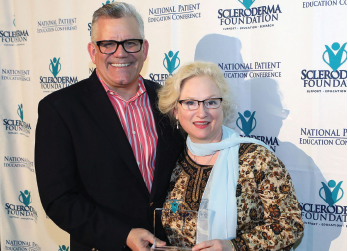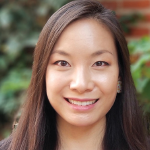Scleroderma Foundation Names Doctor of the Year
 The Scleroderma Foundation has named Lesley Ann Saketkoo, MD, MPH, doctor of the year for her leadership and commitment to the scleroderma community. Dr. Saketkoo is an associate professor of clinical medicine at Tulane University School of Medicine, New Orleans.
The Scleroderma Foundation has named Lesley Ann Saketkoo, MD, MPH, doctor of the year for her leadership and commitment to the scleroderma community. Dr. Saketkoo is an associate professor of clinical medicine at Tulane University School of Medicine, New Orleans.
Dr. Saketkoo is an internationally recognized researcher, educator and clinician in scleroderma/systemic sclerosis, sarcoidosis, myositis, pulmonary hypertension and interstitial lung disease. According to the Foundation website, “She was principal investigator of the large study that identified the minimal set of outcome measures for connective tissue disease-related ILD and also for idiopathic pulmonary fibrosis for use in clinical trials; and is the regional principal investigator for the PHAROS study and the NIH-sponsored Genome Research in African American Scleroderma Patients study.”
“Patient involvement is trendy right now,” she says. That fits her philosophy of engaging her patients in her research related to the scleroderma registry and trials design. “Patients and their families are the experts,” Dr. Saketkoo says. “They have an intimate range of knowledge and are a gold mine of information.”
Gathering the history of how symptoms develop, quantifying those conversations through coding and then running analyses should help improve measurements of disease severity.
Seeing life with scleroderma from the patients’ eyes is key when addressing such issues as why a particular trial has trouble with enrollment. The patients may be able to offer insight into difficulties the providers had no idea of.
Dr. Saketkoo finds great value in discussing what patients expect from trials and new drugs. “What are they ready to barter concerning benefits vs. side effects?” she asks, noting patients are not only stressed by their life-threatening condition, but also by having to cope with daily life.
She has visited Capitol Hill to educate representatives and senators. Dr. Saketkoo wants to raise awareness of the condition among lay people, too, because it could lead to earlier diagnosis and treatment, which in turn can lead to decreased severity of symptoms.
Dr. Saketkoo received her post-graduate degrees and trained in pediatrics and internal medicine at Tulane University and rheumatology at Louisiana State University. She holds faculty appointments in both pulmonary medicine and rheumatology. She established the internationally recognized Scleroderma and Sarcoidosis Patient Care and Research Center (SSPCRC) between Tulane and LSU in 2011 and is co-director of the clinical research and director of wellness practices at the LSU-Tulane collaborative Comprehensive Pulmonary Hypertension Center.
‘Patients & their families are the experts. They have an intimate range of knowledge & are a gold mine of information.’—Dr. Saketkoo
Award for Adult Lupus Research
 Paul Hoover, MD, PhD, received a Gary S. Gilkeson Career Development Award from the Lupus Foundation of America for the second consecutive year. Dr. Hoover is an instructor in medicine and rheumatology attending at Brigham and Women’s Hospital in Boston. His award is for adult lupus research.
Paul Hoover, MD, PhD, received a Gary S. Gilkeson Career Development Award from the Lupus Foundation of America for the second consecutive year. Dr. Hoover is an instructor in medicine and rheumatology attending at Brigham and Women’s Hospital in Boston. His award is for adult lupus research.
Dr. Hoover describes his research dissecting the role of myeloid cells in lupus nephritis as fascinating. Within the family of myeloid cells, five recently discovered members in lupus kidney disease are the subject of his investigation. “These five are probably associated with the kidney damage,” he says. The research looks at how the myeloid cells coordinate the immune response, thus damaging kidney tissue.
He says there are “conversations” between the myeloid immune cells. As he and his team develop tools to collect data, a “social network system” starts to emerge. No one has seen that before.
According to the award notice, his work “has the potential to reveal which immune cells and pathways” contribute to kidney damage. New models may emerge to explain human lupus that could lead to Dr. Hoover’s developing “his own laboratory to study the mechanisms of human lupus kidney disease.”
Dr. Hoover earned his MD and PhD from Stanford University, Palo Alto, Calif., and did his residency in internal medicine, as well as his fellowship in rheumatology, at Brigham and Women’s Hospital, Boston.
Award for Pediatric Lupus Research
 This year’s Gary S. Gilkeson Career Development Award from the Lupus Foundation of America for pediatric lupus research was awarded to Joyce Chang, MD. She is an attending physician in the Division of Rheumatology at Children’s Hospital of Philadelphia and an instructor of pediatrics at the Perelman School of Medicine at the University of Pennsylvania, Philadelphia.
This year’s Gary S. Gilkeson Career Development Award from the Lupus Foundation of America for pediatric lupus research was awarded to Joyce Chang, MD. She is an attending physician in the Division of Rheumatology at Children’s Hospital of Philadelphia and an instructor of pediatrics at the Perelman School of Medicine at the University of Pennsylvania, Philadelphia.
Her clinical interest is in helping youth with complex diseases, such as lupus, learn to take charge of their disease and navigate the healthcare system into adulthood. Dr. Chang’s research on attenuated nocturnal blood pressure dipping and subclinical atherosclerosis in child-onset lupus involves identifying non-invasive measures of vascular health in children. Tracking vascular health in children with lupus is vital, because these patients face a higher risk of cardiovascular disease and damage than their adult counterparts.
Among the ways to measure vascular health, perhaps the easiest uses a finger pulse. “After placing the finger into a gel pack,” she says, “you staunch the blood flow into the finger for a short time and then measure the time needed to resume normal blood flow.” Another method is to monitor a sleeping test subject with a blood pressure cuff that automatically records blood pressure every 30 minutes.
Dr. Chang received her medical degree from the Perelman School of Medicine at the University of Pennsylvania, where she was a 21st Century Endowed Scholar. While at Perelman, she also was awarded the Russell J. Stumacher MD Memorial Prize, as well as the Emily and Francis Botelho Prize for Excellence in Basic Science. She completed both her residency in pediatrics and fellowship in pediatric rheumatology at Children’s Hospital of Philadelphia.
Ann-Marie Lindstrom is an independent writer and editor based in the Tucson, Ariz., area.



